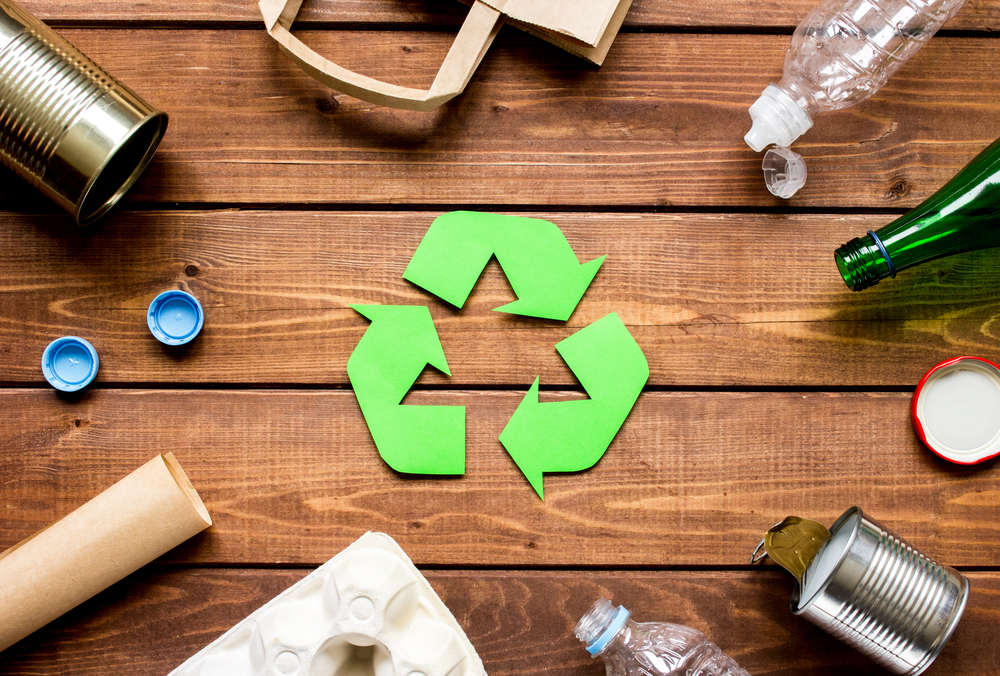Recent research reveals that over half of UK households still face confusion when tackling their recycling, with almost 50% of these throwing away recyclable items due to their lack of knowledge and awareness on recycling. Meanwhile, others are mistakenly depositing non-recyclable materials in recycling bins, which complicates the process further.
To aid you in your everyday recycling tasks, the waste management experts at RecycleZone have used our unmatched knowledge on recycling to help you understand what can be recycled and how.
What materials can be recycled?
Broadly speaking, there are plenty of recyclable materials and processes that help make the world a better, more environmentally friendly place. These include some of the following materials, all of which will be discussed in greater detail in this post:
- Paper
- Glass
- Cardboard
- Cartons
- Plastic
- Aluminum and some other metals
- Food waste
What glass can be recycled?
Glass is recyclable and as a material it can be recycled continuously without losing quality, which is fantastic news for the environment. The most commonly recycled glass products are glass jars, such as those that contain sauce or food, and glass bottles, like milk and coca-cola bottles.
It is important to note, however, that certain glass products cannot be recycled since they are contaminated with other materials or other glass types. This is problematic since different glass varieties each have their own melting points, which naturally require different recycling methods.
You should also not recycle dirty glass jars since this complicates the recycling process. This issue can easily be resolved by thoroughly rinsing all glass materials and jars before putting it in the recycling to be taken away.
It is also vital to remember that unlike certain glass bottles and jars, glass homeware (such as Pyrex jugs) and trays are non-recyclable, since these are heat treated to make them fit for kitchen use. This means they cannot easily be melted unlike other glass items.
What paper can be recycled?
Most paper can be recycled, including office paper, magazines, newspapers and certain wrapping paper. Technically, this also extends to cardboard too, since cardboard boxes and delivery boxes are also commonly recycled.
There are, however, some instances where paper and cardboard is non-recyclable. In particular, you should not recycle paper where it is in the form of tissues, wipes, sticky paper, shiny and glitter gift paper and cards.
To ensure your paper is recyclable, you should remove any plastic wrappers and coating on paper since this must be recycled separately or not at all. It is also vital to prevent your recycling from becoming damp, since this means it is unfit for paper recycling.
What plastics can be recycled?
Knowing which plastics can be recycled is slightly more complex, and it is often useful to refer to and understand recycling symbols when it comes to plastic as these give more technical insight.
The most commonly recycled plastic includes plastic bottles, fizzy drink bottles and yoghurt pots, all of which are classed as PET recyclable plastic. Some other recyclable materials are in the HDPE category, such as milk bottles, bottle tops, toiletry bottles, carrier bags and tubs.
However, some plastics are non-recyclable such as crisp wrappers, cling films, hoses and plastic furniture, so you should be sure to separate these.
Can food waste be recycled?
The UK has a major food waste crisis, with tonnes of food wasted in commercial and domestic settings every day. Fortunately, food waste is recyclable. That is so long as it isn’t a liquid or still packaged, as this proves messy and inconvenient when processed at a recycling plant. Interestingly, when recycled alongside garden waste or alone, food waste can create compost or be used as a form of electricity.
Raw and out of date food can all be recycled in the bin, but be sure to store it appropriately and in specific bags since food waste is notorious for attracting maggots and pests.
Can metal be recycled?
The most suitable metals to be recycled are steel and aluminium, mainly since recycling these is far more viable economically and environmentally. For example, aluminium cans can be recycled at just 5% of the energy and greenhouse gas output that production of entirely new cans are. Fortunately, aluminum is a commonly used metal for anything from vehicles to electrical wiring and tin cans, so can easily be found around the home and recycled.
However, alloy metals, used to describe a mixture of metals, are notoriously more difficult to recycle as all of these metals have different melting points and therefore need to be treated separately to be recycled, if at all! For this reason it is better practice to hire a reliable waste management company to separate and recycle your metal for you, along with your other waste!
Essentially, recycling our waste is an integral part of protecting the environment. However, it can prove tedious when you have plenty of waste to separate and distinguish, or when you simply don’t know what goes where!
To aid you in your ethical and responsible waste management efforts, RecycleZone is on hand for advice and to offer a wide range of waste management services!
Feature image credit: 279photo Studio / Shutterstock
